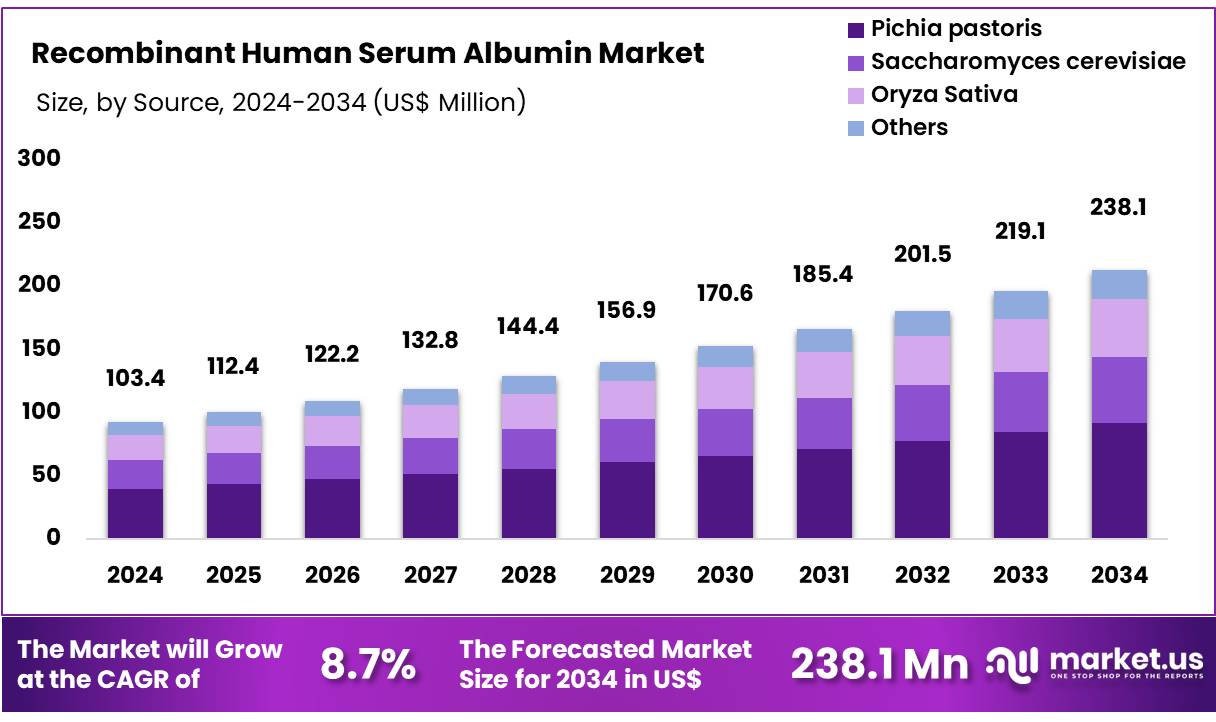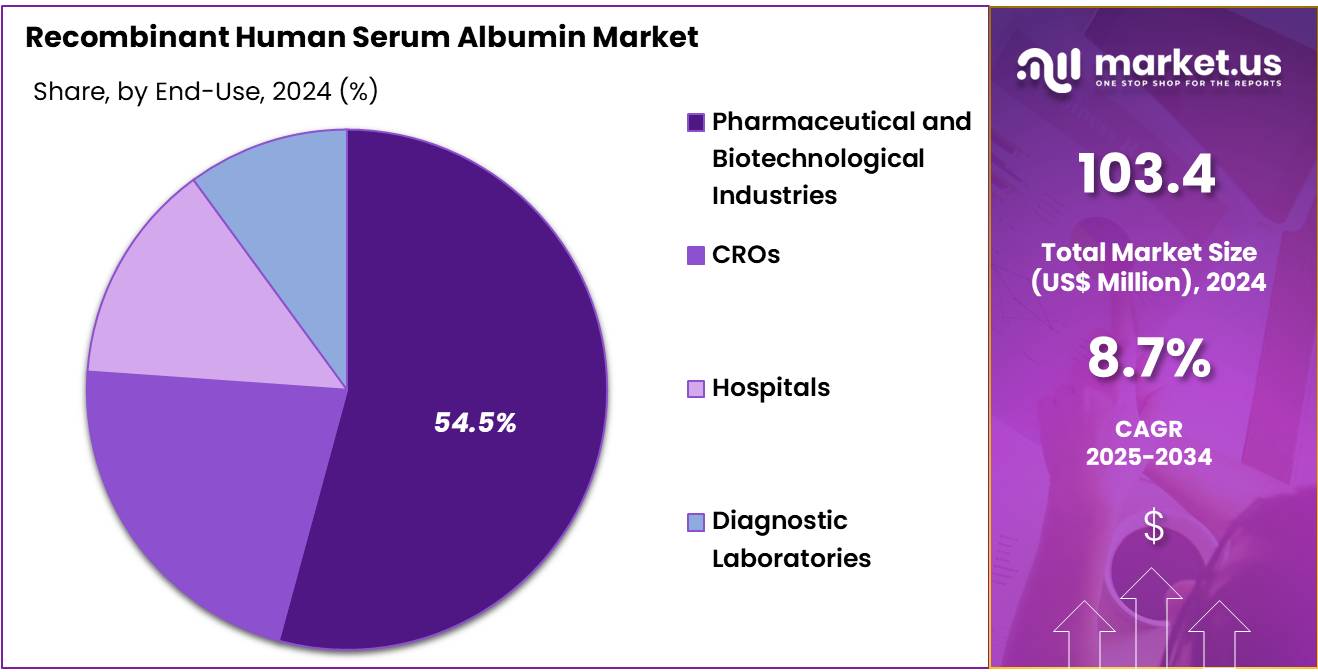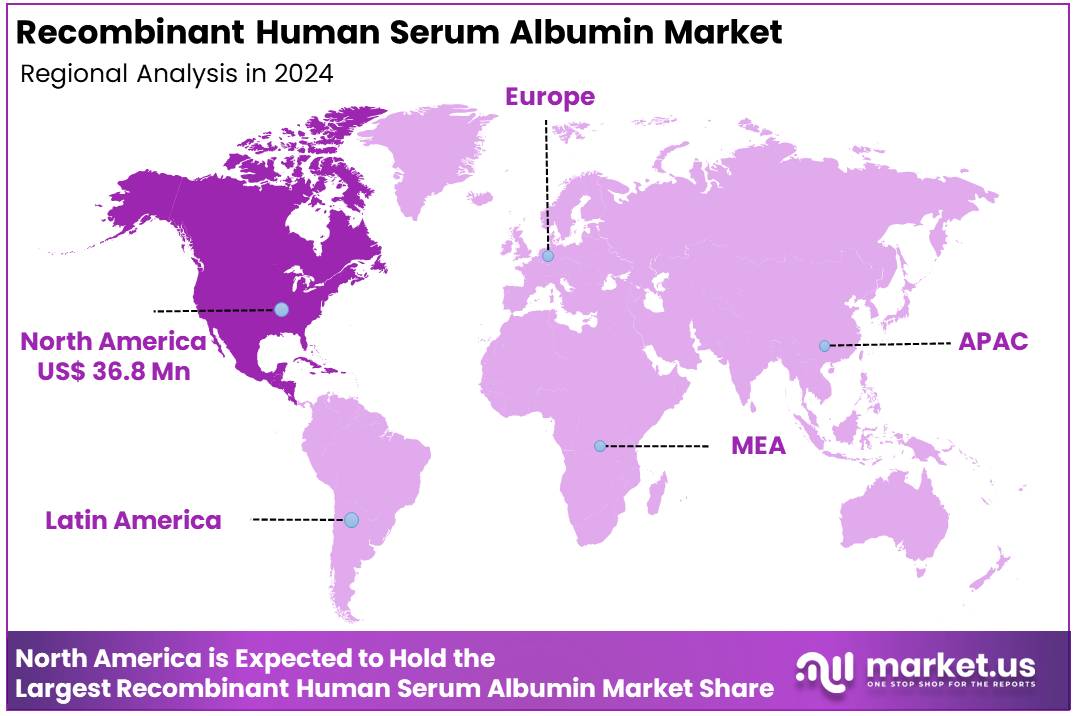Global Recombinant Human Serum Albumin Market By Source (Pichia pastoris, Saccharomyces cerevisiae, Oryza Sativa, and Others), By Application (Cell Culture Media, Stem Cell Therapy, Drug Formulations, Cryopreservation, and Others), By End-Use (Pharmaceutical and Biotechnological Industries, CROs, Hospitals, and Diagnostic Laboratories), By Region, and Key Companies - Industry Segment Outlook, Market Assessment, Competition Scenario, Trends and Forecast 2025-2034
- Published date: March 2025
- Report ID: 12531
- Number of Pages: 345
- Format:
-
keyboard_arrow_up
Quick Navigation
Report Overview
Global Recombinant Human Serum Albumin Market was valued at US$ 103.4 Million in 2024 and is expected to grow at a CAGR of 8.7% from 2024 to 2034. In 2024, North America led the market, achieving over 35.6% share with a revenue of US$ 36.8 Million.
Recombinant Human Serum Albumin Market, Global Analysis, 2020-2024 (US$ Million)
Global 2020 2021 2022 2023 2024 CAGR Revenue 75.9 81.5 90.3 95.9 103.4 8.7% The global recombinant human serum albumin (rHSA) market is witnessing significant growth, driven by increasing demand for safe, high-purity alternatives to plasma-derived albumin. This growth is fueled by the expanding biopharmaceutical industry, where rHSA is used in drug formulations, cell culture media, and vaccine production, offering a pathogen-free and consistent option. Advancements in recombinant DNA technology have improved production efficiency, further boosting its adoption.
The global biotechnology and pharmaceutical industries are increasingly adopting serum-free cell culture systems to reduce the risk of contamination and improve reproducibility. This has driven demand for high-quality recombinant proteins like rHSA, which act as key supplements in these media formulations. The rapid growth of biologics, including monoclonal antibodies, gene therapies, and vaccines, has significantly increased the demand for rHSA as a stabilizer in drug formulations.
The rise of advanced therapies such as CAR-T cell therapy has further boosted this trend. The use of rHSA in drug delivery systems, particularly nanoparticle-based approaches, is growing. This is part of a broader trend toward personalized medicine and targeted therapies that improve drug efficacy and reduce side effects.
- In March 2023, Albumedix Ltd. (now part of Sartorius) and Heartseed Inc. announced that Recombumin® was being used in Heartseed’s HS-001, an investigational cell therapy aimed at remuscularizing damaged cardiac tissue. This development marked an important milestone in the use of rHSA in advanced regenerative medicine applications.

Key Takeaways
- The global recombinant human serum albumin market was valued at USD 103.4 million in 2024 and is anticipated to register substantial growth of USD 238.1 million by 2034, with 8.7% CAGR.
- In 2024, the pichia pastoris segment took the lead in the global market, securing 38.7% of the total revenue share.
- The cell culture media segment took the lead in the global market, securing 34.5% of the total revenue share.
- The pharmaceutical and biotechnological industries segment took the lead in the global market, securing 54.5% of the total revenue share.
- North America maintained its leading position in the global market with a share of over 35.6% of the total revenue.
Source Analysis
Based on source the market is fragmented into pichia pastoris, saccharomyces cerevisiae, oryza sativa, and others. Amongst these, pichia pastoris segment dominated the global recombinant human serum albumin market capturing a significant market share of 38.7% in 2024. This notable share highlights its growing adoption as a host organism for rHSA production due to its cost-efficiency, ease of genetic manipulation, and high-yield expression capabilities. rHSA, used in pharmaceutical formulations, vaccines, and cell culture media, is increasingly produced using Pichia pastoris because it offers an effective alternative to traditional methods that rely on human plasma.
Pichia pastoris is widely adopted due to its capability to produce high-density cultures and express complex proteins with proper folding and post-translational modifications, similar to mammalian systems, but at a lower cost. Its ability to grow in methanol-based media and achieve high protein expression levels provides an advantage in large-scale production.
- For instance, it can produce 5-10 g/L of recombinant proteins, which is higher than many other expression systems.
Recombinant Human Serum Albumin Market, Source Analysis, 2020-2024 (US$ Million)
Source 2020 2021 2022 2023 2024 Pichia pastoris 26.0 28.0 31.1 33.2 35.9 Saccharomyces cerevisiae 10.3 11.3 12.8 13.9 15.3 Oryza sativa 29.8 31.9 35.1 37.1 39.8 Others 9.7 10.2 11.1 11.7 12.4 Application Analysis
The market is fragmented by application into cell culture media, stem cell therapy, drug formulations, cryopreservation, and others. Cell culture media dominated the global recombinant human serum albumin market capturing a significant market share of 34.5% in 2024.
Recombinant Human Serum Albumin (rHSA) plays a crucial role in cell culture media due to its ability to support cell growth, stabilize proteins, and regulate osmotic pressure. It is used as a supplement in various types of cell culture media, especially for stem cells, hybridoma, and mammalian cell lines, as it mimics natural albumin’s biological functions without the risks of contamination from blood-derived sources. rHSA have their key application in biopharmaceutical production, where it enhances cell viability and productivity.
For instance, rHSA is used in the production of monoclonal antibodies and viral vectors for gene therapy. Studies have shown that it improves the yield of recombinant proteins. In a study on CHO (Chinese Hamster Ovary) cells, rHSA increased viable cell density by 15-20% compared to media without albumin supplementation.
Recombinant Human Serum Albumin Market, Application Analysis, 2020-2024 (US$ Million)
Application 2020 2021 2022 2023 2024 Cell Culture Media 26.5 28.4 31.3 33.2 35.7 Stem Cell Therapy 16.5 17.5 19.2 20.2 21.6 Drug Formulations 8.9 9.8 11.1 12.1 13.3 Cryopreservation 13.7 14.8 16.5 17.6 19.1 Others 10.3 11.0 12.1 12.8 13.7 End-Use Analysis
The market is fragmented by end-use into pharmaceutical and biotechnological industries, CROs, hospitals, and diagnostic laboratories. Pharmaceutical and biotechnological industries dominated the global recombinant human serum albumin market capturing a significant market share of 54.5% in 2024. In 2023, the Pharmaceutical and Biotechnological Industries emerged as the leading sector in the global recombinant human serum albumin (rHSA) market.
The strong performance of this sector is primarily driven by the increasing demand for rHSA in various applications, including drug formulation, vaccine development, and biopharmaceutical manufacturing. For instance, rHSA is widely used in the formulation of monoclonal antibodies, which are pivotal in treating diseases like cancer and autoimmune disorders.
Major pharmaceutical companies, such as Roche and Amgen, utilize rHSA in their biologic drug production to enhance stability and efficacy. Moreover, rHSA serves as a crucial stabilizing agent in vaccines, particularly in the development of COVID-19 vaccines.
- For instance, during the pandemic, companies like Pfizer and Moderna incorporated rHSA into their formulations to ensure the stability and effectiveness of their mRNA vaccines. This further illustrates rHSA’s essential role in modern medicine.
Recombinant Human Serum Albumin Market, End-Use Analysis, 2020-2024 (US$ Million)
End-Use 2020 2021 2022 2023 2024 Pharmaceutical and Biotechnological Industries 41.7 44.7 49.4 52.4 56.4 CROs 20.0 21.8 24.4 26.2 28.6 Hospitals 7.7 8.2 8.9 9.4 10.0 Diagnostic Laboratories 6.5 6.9 7.6 8.0 8.5 
Key Segments Analysis
By Source
- Pichia pastoris
- Saccharomyces cerevisiae
- Oryza Sativa
- Others
By Application
- Cell Culture Media
- Stem Cell Therapy
- Drug Formulations
- Cryopreservation
- Others
By End-Use
- Pharmaceutical and Biotechnological Industries
- CROs
- Hospitals
- Diagnostic Laboratories
Market Dynamics
Rising Incidence of Liver Disease and Sepsis
The rising incidence of conditions such as liver disease and sepsis is a significant driver of the recombinant human serum albumin (rHSA) market, as these conditions often necessitate albumin supplementation. Human serum albumin (HSA) is crucial in maintaining oncotic pressure and proper fluid balance in the body, and its deficiency is common in patients with liver dysfunction or severe infections like sepsis.
Recombinant human serum albumin offers a safer, contamination-free alternative to plasma-derived albumin, addressing both safety concerns and supply limitations. Liver diseases such as cirrhosis, hepatitis, and liver failure disrupt the liver’s ability to synthesize albumin.
- According to the World Health Organization (WHO), approximately 2 million deaths occur annually due to liver diseases globally, with cirrhosis accounting for over 1 million deaths.
Market Restraints
High Production Costs
One of the primary restraints on the recombinant human serum albumin (rHSA) market is the high cost of production. Producing rHSA involves complex biotechnological processes, including recombinant DNA technology and advanced protein expression systems. These methods require sophisticated equipment, highly specialized labor, and significant investments in research and development, all of which contribute to higher production costs compared to plasma-derived human serum albumin.
Unlike plasma-derived albumin, which is collected from donated human blood and processed through established procedures, recombinant albumin must be synthesized in controlled environments using genetically engineered cell lines such as yeast, rice, or mammalian cells.
Market Opportunities
Adoption of Recombinant Human Serum Albumin (rHSA) in Scalable Cell Therapy Manufacturing
One of the most promising opportunities in the rapidly expanding cell therapy industry is the shift towards using recombinant human serum albumin (rHSA), to replace traditional human or bovine serum albumin (HSA/BSA). This transition addresses several key challenges in cell therapy manufacturing, including concerns over contamination risks, supply chain constraints, and manufacturing inconsistencies associated with serum-derived products.
This consistency is critical for the reliable manufacturing of high-quality cell therapies. Moreover, the plant-based system allows for large-scale production, addressing the growing demand for albumin in the cell therapy space, which is expected to increase dramatically as more therapies gain regulatory approval.
- For instance, the U.S. FDA anticipates 10-20 new cell therapy approvals annually by 2025, creating a heightened demand for excipients like rHSA.
Impact of macroeconomic factors / Geopolitical factors
The global recombinant human serum albumin (rHSA) market is significantly influenced by macroeconomic and geopolitical factors. Economic conditions such as inflation, interest rates, and global economic growth directly affect research and development budgets, healthcare spending, and investment in biotechnology. In periods of economic uncertainty or recession, funding for medical research and biotechnological innovation may decline, negatively impacting the market.
Geopolitical tensions and trade policies also play a crucial role, as they can disrupt the supply chains of raw materials and manufacturing processes essential for rHSA production. Trade restrictions, tariffs, or conflicts can lead to increased production costs and limited market access, especially for international players.
Furthermore, geopolitical stability in key regions, such as the U.S., EU, and China, affects collaboration opportunities and regulatory frameworks, which are vital for market expansion. Thus, both macroeconomic and geopolitical conditions are crucial determinants of the rHSA market’s growth trajectory and stability.
Latest Trends
The global recombinant human serum albumin (rHSA) market is experiencing several key trends driven by advancements in biotechnology and growing demand for biopharmaceuticals. One significant trend is the increasing use of rHSA in drug formulation and vaccine development, particularly for stabilizing proteins and cell culture applications.
With the rising prevalence of chronic diseases and the growing focus on personalized medicine, demand for high-quality biopharmaceuticals is fueling market growth. Another trend is the shift toward cost-effective and scalable production techniques, such as the use of plant-based or cell-free systems for rHSA manufacturing. Additionally, the development of biosimilars and expanding applications in gene therapy and cell-based therapies are contributing to market expansion.
Regional Analysis
The demand for rHSA in North America is significantly influenced by its widespread use in therapeutic applications, particularly for chronic diseases such as diabetes and cancer, where stabilization of biologic drugs is crucial. For example, rHSA is critical in enhancing the stability and efficacy of insulin formulations and cancer therapeutics, ensuring these medications are safe and effective over their shelf life.
This region’s market is characterized by robust growth with a CAGR of 8.4%, driven by a strong foundation in biotechnological research and a well-established healthcare system. The U.S. and Canada, as leaders in biopharmaceutical innovation, host numerous cutting-edge biotech firms and research institutions that actively explore and expand the applications of rHSA.
Recombinant Human Serum Albumin Market, Regional Analysis, 2020-2024 (US$ Million)
Region 2020 2021 2022 2023 2024 North America 27.3 29.3 32.3 34.2 36.8 Europe 21.5 23.1 25.5 27.1 29.3 Asia Pacific 17.2 18.7 21.0 22.6 24.7 
Key Regions and Countries
North America
- US
- Canada
Europe
- Germany
- France
- The UK
- Spain
- Italy
- Russia
- Netherland
- Rest of Europe
Asia Pacific
- China
- Japan
- South Korea
- India
- New Zealand
- Singapore
- Thailand
- Vietnam
- Rest of APAC
Latin America
- Brazil
- Mexico
- Rest of Latin America
Middle East & Africa
- South Africa
- Saudi Arabia
- UAE
- Rest of MEA
Key Players Analysis
The global recombinant human serum albumin (rHSA) market is competitive, with key players leveraging innovation, partnerships, and geographical expansion to strengthen their positions. Major companies include Albumedix Ltd., Merck KGaA (Sigma-Aldrich), Thermo Fisher Scientific, Ventria Bioscience, and Shandong Xinhua Pharmaceutical. These companies focus on providing high-quality rHSA for pharmaceutical, biotechnological, and research applications, with significant investments in R&D to improve production processes and meet regulatory standards.
Thermo Fisher Scientific Inc. is a global leader in providing laboratory products and services, specializing in scientific instrumentation, reagents, and software. Thermo Fisher offers comprehensive solutions for life sciences research, clinical diagnostics, and production of biologics and vaccines. Its key products include laboratory equipment, analytical instruments, consumables, and specialized software, with an emphasis on innovation and technological advancement to support scientific discovery.
In addition, Merck KGaA, Darmstadt, Germany, is a leading global science and technology company, operating in the healthcare, life sciences, and performance materials sectors. The company is renowned for its life science division, which supplies tools and services for drug development, research, and diagnostics.
Top Key Players
- Thermo Fisher Scientific Inc.
- Merck KGaA
- Sartorius AG
- ACROBiosystems
- Abcam Limited.
- Atlantis Bioscience Pte Ltd.
- Lee Biosolutions, Inc.
- HiMedia Laboratories.
- InVitria
- Albumin Bioscience
- Lazuline Bio
Recent Developments
- In August 2022, Albumedix, a leading provider of recombinant human albumin products, was acquired by Sartorius, a German Biotech company. This acquisition has strengthened its portfolio of innovative advanced therapy solutions.
- In March 2023, Albumedix Ltd., now part of the global life science group Sartorius, and Heartseed Inc., based in Tokyo, Japan, announced that Recombumin® plays a crucial role in Heartseed’s HS-001, an investigational cardiac remuscularization cell therapy. This therapy has entered the phase of first-in-human dosing.
Report Scope
Report Features Description Market Value (2024) US$ 103.4 Million Forecast Revenue (2034) US$ 238.1 Million CAGR (2025-2034) 8.7% Base Year for Estimation 2024 Historic Period 2020-2023 Forecast Period 2025-2034 Report Coverage Revenue Forecast, Market Dynamics, COVID-19 Impact, Competitive Landscape, Recent Developments Segments Covered By Source (Pichia pastoris, Saccharomyces cerevisiae, Oryza Sativa, and Others), By Application (Cell Culture Media, Stem Cell Therapy, Drug Formulations, Cryopreservation, and Others), By End-Use (Pharmaceutical and Biotechnological Industries, CROs, Hospitals, and Diagnostic Laboratories) Regional Analysis North America – US, Canada; Europe – Germany, France, The UK, Spain, Italy, Russia, Netherlands, Rest of Europe; Asia Pacific – China, Japan, South Korea, India, New Zealand, Singapore, Thailand, Vietnam, Rest of APAC; Latin America – Brazil, Mexico, Rest of Latin America; Middle East & Africa – South Africa, Saudi Arabia, UAE, Rest of MEA Competitive Landscape Thermo Fisher Scientific Inc. , Merck KGaA, Sartorius AG, ACROBiosystems, Abcam Limited., Atlantis Bioscience Pte Ltd., Lee Biosolutions, Inc., HiMedia Laboratories., InVitria, Albumin Bioscience, and Lazuline Bio Customization Scope Customization for segments, region/country-level will be provided. Moreover, additional customization can be done based on the requirements. Purchase Options We have three licenses to opt for: Single User License, Multi-User License (Up to 5 Users), Corporate Use License (Unlimited User and Printable PDF)  Recombinant Human Serum Albumin MarketPublished date: March 2025add_shopping_cartBuy Now get_appDownload Sample
Recombinant Human Serum Albumin MarketPublished date: March 2025add_shopping_cartBuy Now get_appDownload Sample -
-
- Thermo Fisher Scientific Inc.
- Merck KGaA
- Sartorius AG
- ACROBiosystems
- Abcam Limited.
- Atlantis Bioscience Pte Ltd.
- Lee Biosolutions, Inc.
- HiMedia Laboratories.
- InVitria
- Albumin Bioscience
- Lazuline Bio









